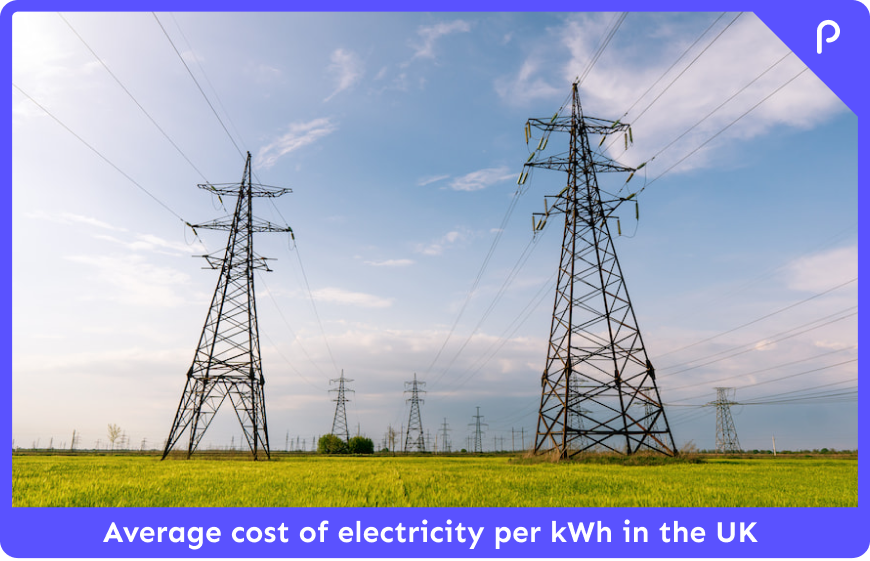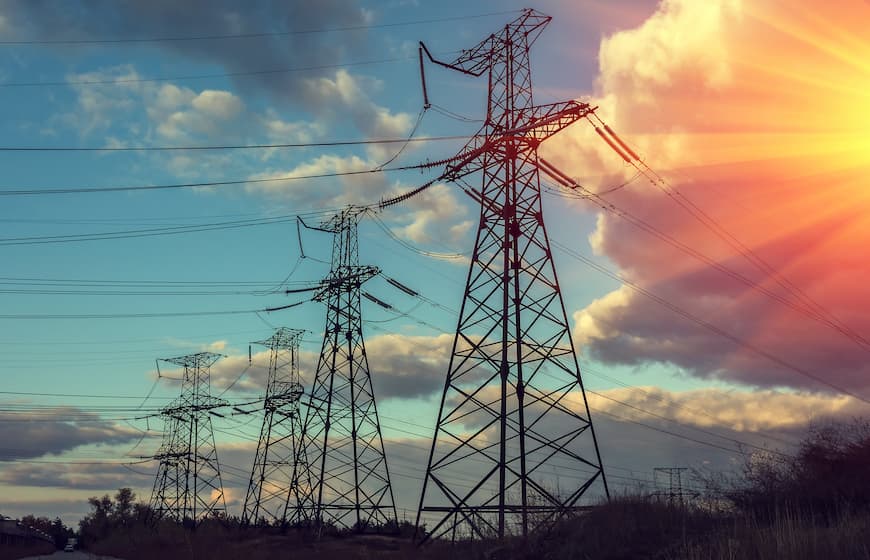kWh: What is the price of energy in the UK?

Are you ready to make the switch?
Switching energy suppliers has never been easier. Simply let our experts cater to all
of your gas and electricity needs.
Switch now
Gas and electricity are measured in kWh, although they are charged at different rates. The kWh cost of energy will vary according to what tariff you are on, your chosen supplier, where you are in the country and even what time of the day you use it. If you feel you are paying too much for your kWh, then you are entitled to look for a better deal from another supplier. Here at Papernest we can help you make this switch. As prices per kWh vary according to what part of the UK you live in, it might be worth comparing energy prices to find a tariff that suits you best. But first, lets dive into the cost of kWh.
Last update: November 2022
As you may have heard on the news, the UK energy market is currently under an immense amount of stress as a result of a global gas shortage driving up costs and putting several energy suppliers out of business. To learn more about this and stay updated on a daily basis you can read our page on the UK energy crisis.
It’s also worth thinking about what appliances you use in your home and how much power they consume, as this has a big impact on your energy bill. There are also a number of other ways you can reduce your energy usage, such as better insulation, boiler maintenance and changing energy habits.

How much does a kWh cost in the UK?
The average kWh cost of standard electricity in the UK is, as of today, 50.65 pence per kWh, according to the Department for Business, Energy & Industrial Strategy (BEIS). For gas it is 15.73 pence per kWh. However, you must take two elements into account when considering these prices:
- These are just the national averages. Different regions of the UK pay more or less for their energy, and the rate you pay also depends on your contract or rate with your supplier. Generally, a kWh of energy will cost less on a fixed rate than it will on a standard variable rate, so it is worth checking your bill to see what tariff you are on.
- To compare energy tariffs you need to take into account both the unite rate, or kwh cost, and the standing charges, daily charges you pay to your energy supplier.
Your bill will list how much you pay per kWh of energy, and help you to compare your rates to the national average and those offered by other suppliers.
What is a kW and what is a kWh?
A kilowatt hour, known as a kWh, is a way of measuring how much energy you consume. It is a unit that keeps track of the amount of energy used by appliances running over a period of time.
Imagine you have a 100-watt lightbulb switched on. It would take 10 hours to use up 1 kWh of energy. Alternatively, a 2,000-watt tumble dryer would use 1 kWh in just 30 minutes.
How much is 1kw in one hour?
One kWh is the amount of energy you would use if you ran a 1,000-watt appliance for one hour. In the metric system, 1,000 = kilo, so 1,000 watts is equal to one kilowatt. For example, if you switch on a 100-watt light bulb, it would take 10 hours to use one kilowatt-hour of energy.
What is the average electricity standing charge?
Standing charges generally range from about 5p to 60p per day for electricity, depending on your choice of tariff and location. Since the beginning of the energy crisis these prices have soared to reach an average of 35.92 for electricity and 28.34 in November 2022.
It is usually paid at a flat rate, so won’t go up or down over time, unlike the cost per kWh of power.
Ofgem removed the legal requirement to have a standing charge in 2016. Before the energy crisis several suppliers in the UK had opted not to use it such as Utilita with their Smart Energy tariffs. This might sound like a good idea but the price per unit is high, so whether you save at all could depend on factors like your energy usage or location. This is why we don't recommend them for most households that use energy every day, but we do for vacation homes that may go extended periods of time without the power being used.
Who offers the cheapest energy per kwh in November 2022?
The cheapest dual fuel tariffs in the UK as of November 2022 are as follows:
*Prices vary from one city to another, so we display national averages
*Based on Ofgem’s TDCV (2,900.00 kWh of ⚡ and 12,000.00 kWh of 🔥 per year).
**A tariff is green if for each kWh consumed a kWh of renewable energy is injected in the grid.
Cheapest Fixed Dual Fuel Tariff in the UK
If you are looking for a fixed rate tariff, you'll find them below:
*Prices differ on a postcode basis, this table therefore displays national averages
*Based on the official TDCV : 2,900.00 kWh of ⚡ and 12,000.00 kWh of 🔥 per year
**Is a Green tariff if all the energy consumed is compensated by renewable energy injections in the grid.
Which energy tariffs are live?
As you know, the energy market is currently in turmoil and only few suppliers currently offer live tariffs. In the following table we filtered the offers that are available as we talk.
| Supplier | Type | Name | Availability | Annual Cost | Green Tariff** |
|---|---|---|---|---|---|
 | Dual Fuel | Double Gold | ✅ | 2,511.54* | ✖️ |
 | Dual Fuel | Prepayment | ✅ | 2,581.02* | ✖️ |
 | Dual Fuel | Prepayment Variable | ✅ | 2,608.87* | ✖️ |
 | - | - | - | -* | - |
*Prices vary from one city to another, so we display national averages
*Based on 2,900.00 kWh of ⚡ and 12,000.00 kWh of 🔥 per year on average
**Is a Green tariff if all the energy consumed is compensated by renewable energy injections in the grid.
Who offers the cheapest electricity?
In the latest report, published 2021, the Department for Business, Energy & Industrial Strategy(BEIS) declared the average cost for standard electricity in the UK was 18.9 p/kWh.
How do you calculate the cost of 1 kWh?
The kilowatt-hour rate is the price of electricity supplied by your electricity provider. To figure out your kilowatt-hour rate, divide your total electricity bill, minus all taxes, by your total electricity consumption.
To find out if you are paying above or below the UK average, take a look at your most recent bill. This should give you the electricity price you are paying per kWh. If it’s less than 18.9p/kWh then you are on an affordable tariff. However, again, it does depend where you live.
*Prices differ on a postcode basis, this table therefore displays national averages
*Based on 2,900.00 kWh of ⚡ and 12,000.00 kWh of 🔥 per year on average
**A Green tariff means the supplier injects in the grid the same amount of renewable energy that is consumed.
Which electricity tariffs are live?
Following you'll find the cheapest electricity tariffs that are currently live.
*Prices differ on a postcode basis, this table therefore displays national averages
*Based on Ofgem’s TDCV (2,900.00 kWh of ⚡ and 12,000.00 kWh of 🔥 per year).
**Is a Green tariff if all the energy consumed is compensated by renewable energy injections in the grid.


Want to switch energy suppliers? Switching with us has never been simpler.
Free Service
Let Papernest help you with your electricity and gas needs.
More info
Gas price per kWh in the UK
The average cost of a kWh of gas in the UK is around 7.37p. For electricity, it is about 18.9p.
Is gas cheaper than electricity?
Gas is cheaper than electricity. However, as around 80% of homes in the UK are hooked up to gas mains and use this as a heating source, we tend to use a lot more gas.
On average we use about 12,000 kWh of gas a year in the Uk. This will go up and down depending on the size of your home. We use around 2,900 kWh of electricity on average. So, it usually means we end up paying a little more per year for electricity than we do for gas.
The three cheapest gas tariffs in the UK are currently:
*Prices displayed are national averages
*Based on Ofgem’s TDCV (2,900.00 kWh of ⚡ and 12,000.00 kWh of 🔥 per year).
**Is a Green tariff if all the energy consumed is compensated by renewable energy injections in the grid.
Which gas tariffs are live in 2022?
However, not all gas tariffs are available for new customers. For having a better overview for the options that are live, you can look at the following list.
*Prices differ on a postcode basis, this table therefore displays national averages
*Based on Ofgem’s TDCV (2,900.00 kWh of ⚡ and 12,000.00 kWh of 🔥 per year).
**A Green tariff means the supplier injects in the grid the same amount of renewable energy that is consumed.
Unit cost of electricity prices per kWh by UK region
The average electricity bill per month in the UK is £56.50. However, this can be broken down into three sizes of home:
- Small home: £26.50
- Medium home: £40.50
- Large home: £59.25
However, the rates you pay for electricity also vary according to where you live. The rates per kWh across the UK are as follows:
| UK Region | Average variable unit price in 2021 (p/kWh) |
|---|---|
| North Scotland | 18.8p |
| South Scotland | 18.8p |
| North East | 18.4p |
| North West | 18.4p |
| Yorkshire | 18.2p |
| East Midlands | 18.4p |
| West Midlands | 18.6p |
| Merseyside and North Wales | 20.2p |
| South Wales | 19.5p |
| South West | 19.5p |
| London | 18.9p |
| South East | 19.5p |
| Eastern | 18.8p |
| Southern | 18.8p |
![]()

Fixed Electricity Costs per region
As well as paying for what you use, you also have to pay the standing charge. These are fixed costs that you pay, regardless of how much energy you use.
| UK Region | Average fixed cost (£/year) |
|---|---|
| North Scotland | £99.3 |
| South Scotland | £86.7 |
| North East | £90.0 |
| North West | £83.1 |
| Yorkshire | £92.4 |
| East Midlands | £82.9 |
| West Midlands | £88.5 |
| Merseyside and North Wales | £81.6 |
| South Wales | £87.2 |
| South West | £89.8 |
| London | £88.0 |
| South East | £85.6 |
| Eastern | £87.1 |
| Southern | £85.3 |
What affects the price per kWh?
There are a number of factors that affect the cost of a kWh of both gas and electricity in the UK. Increases in price are usually due to an increase in the wholesale price. For electricity, this is usually down to the amount generated. This can be determined by environmental factors and the state of the economy. But it’s not just wholesale prices that affect kWh costs.
Prices also go up and down due to competition. The Big Six energy providers tend to set the prices and group very closely together around the energy price cap. When one raises or lower prices the others usually do the same, and this influences the smaller suppliers around the UK.
Gas prices in the UK are also affected by international factors such as global supply and crisis, as well as by the season and weather conditions. Depending on what kind of meter you have, the price of a kWh may also change according to the time of day.
How are energy bills calculated?
Two main components make up your energy bill. These are the amount of energy you use in kWh and the standing charge – the daily costs of supplying your home. There are also other associated costs such as taxes and environmental charges:
Your bill can be broken down as follows:
- 67% supplier margins and costs
- 16% distribution charges
- 2% transmission charges
- 6% environmental charges
- 5% VAT
- 4% other
How can you make your energy bills cheaper?
There are numerous ways that you can save on your energy bills, including:
- Turning off standby appliances
- Installing a smart thermostat
- Turning down your thermostat
- Installing a new boiler
- Washing clothes at a lower temperature
- Being smarter about water
- Thinking about how well your home is insulated
- Using up to date appliances
However, the main thing to do is to make a switch to a provider that offers better rates, which could help you to save up to £300 on your energy bills.
What can you use a kWh for?
Once you understand what a kWh is and how it works, it opens the door to saving money on your energy bills. For example, every appliance in your home will have a watt rating telling you how much power it uses. For example, you may have a 500-watt heater. That means if you run the heater for one hour it will use 500 watts or half a kWh. This means you can work out how many kWh every appliance uses and see how much it is costing you to run.
You can do this by finding out how much you are paying per kWh of energy. This information will be on your bill. Depending on the type of tariff or meter you have, there may be more than one kWh charge. However, your bill is not quite that simple. As well as paying for your usage, you also need to pay the standing charge (which also all suppliers use in the UK). This is the daily rate you pay to maintain your supply. This, plus your usage, tells you how much you will pay on your bill.
Switch energy suppliers
Without doubt, the best way to save money on your energy bills is to switch provider. There are around 50 small and large suppliers in the UK, each targeting customers in different ways. Depending on how you use your energy, there may be a tariff more suitable to your needs. That means you could find a deal that offers you better value, a dual fuel option, or more sustainable energy to help you reduce your footprint.
All you have to do is find a tariff that you like, then you can make the switch. It couldn’t be easier. Plus, here at Papernest we are on hand to help you with everything you need to switch. Just give us a call on 0330 818 6225 to find out more.
Looking to switch energy deals?Leave your phone number to request a call back from us!
Free Service
FAQ
Is gas cheaper than electricity?
The price per kWh is much cheaper for gas in the UK than electricity, which is why we generally use it for central heating and hot water. However, as we use more of it for these reasons it tends to cost about the same as electricity over the course of a year.
How to work out how much energy is used by an appliance?
To see how many kWh an appliance might be using, find the label and see what wattage it is. If it is 500w, for example, it would need to be on for two hours to make 1000w, or 1kWh.
Who has the cheapest electricity per kWh?
New tariffs are always coming on the market offering cheaper deals. It’s important to look at the difference between unit prices per kWh and the standing charges. These are combined for overall energy prices. However, the energy supplier that has the cheapest unit price is by Click Energy.
Average annual bill per region
The average energy bill across the UK can vary according to the different tariffs, kWh rates and standing charges that apply in different regions.
Updated on 11 Nov, 2022
William Dautel
Website manager
William is a content marketing specialist. After 3 years writing brand strategies he joined papernest to help create the best content to help people handle and save on their utilities.
William is a content marketing specialist. After 3 years writing brand strategies he joined papernest to help create the best content to help people handle and save on their utilities.
Alexander Striano
Energy Specialist & Copywriter
Alex joined the papernest team as a SEO Project Manager Assistant for Broadband Plans. He has developed a real expertise on connectivity topics and works on delivering the best possible content to help you navigate your broadband in and outside your home.
Alex joined the papernest team as a SEO Project Manager Assistant for Broadband Plans. He has developed a real expertise on connectivity topics and works on delivering the best possible content to help you navigate your broadband in and outside your home.





